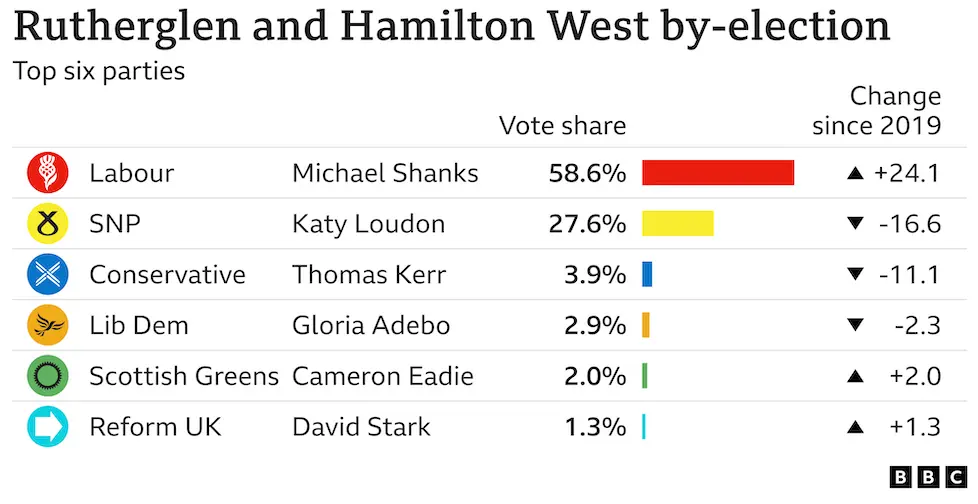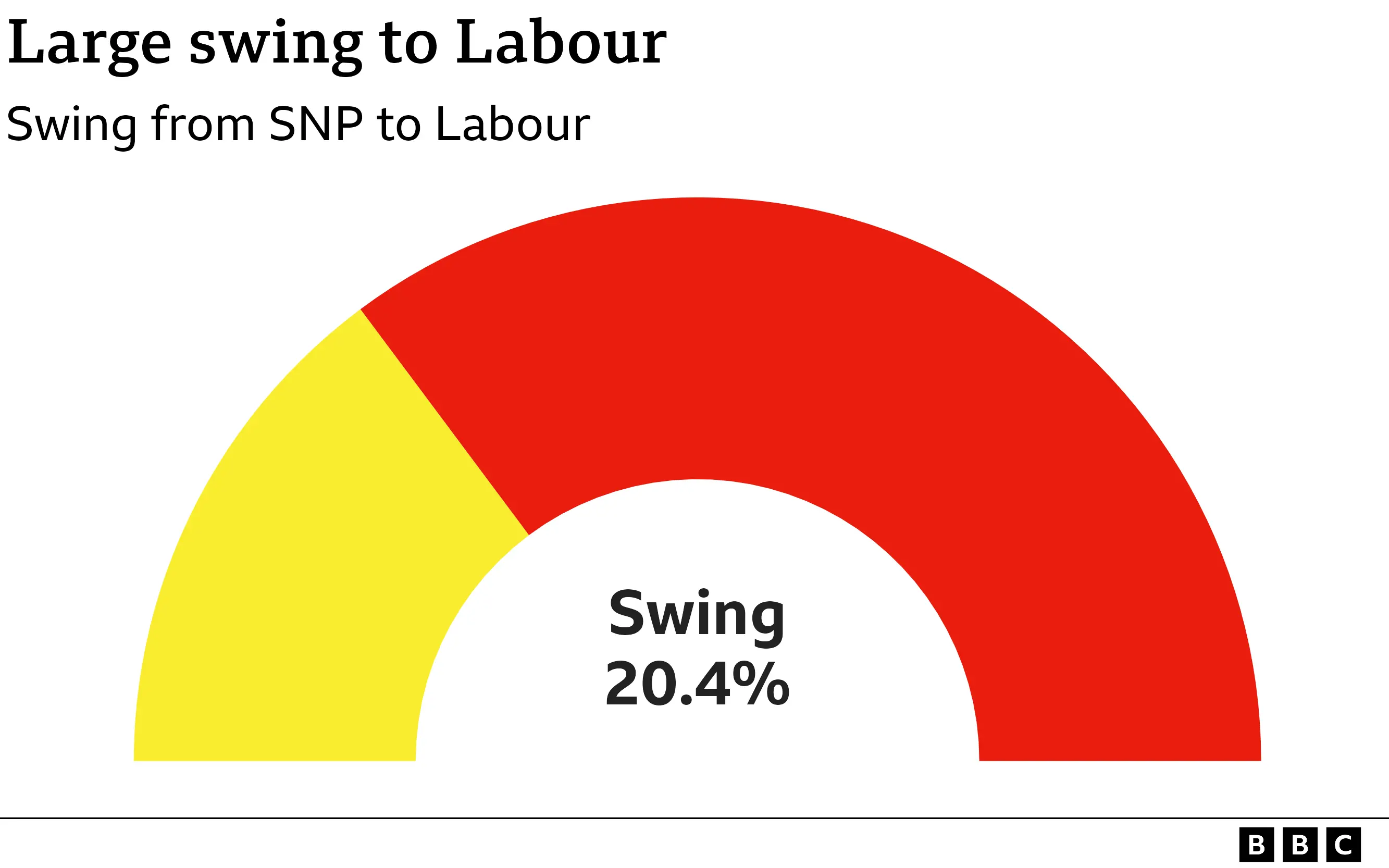Labour defeats SNP to win Rutherglen and Hamilton West by-election
Labour has defeated the SNP to win the Rutherglen and Hamilton West by-election.
The party's candidate, Michael Shanks, took the Westminster seat with 17,845 votes - more than double the number polled by the SNP's Katy Loudon.
The result was a swing of 20.4% from the SNP to Labour.
The by-election was called after former SNP MP Margaret Ferrier was ousted by her constituents for breaking Covid rules.
Labour leader Sir Keir Starmer said it was a "seismic" night and that people in Rutherglen and Hamilton West had sent "a clear message".
He added: "I have always said that winning back the trust of people in Scotland is essential. Tonight's victory is the culmination of three-and-a-half years of hard work and humility on that journey."
SNP candidate Katy Loudon's 8,399 votes represented a 27.6% share of the turnout which was down by 16.6% on the 2019 general election.
This was the first major electoral test for the nationalists since Humza Yousaf succeeded Nicola Sturgeon as leader.
 PA Media
PA Media
The first minister described it as a "disappointing" night for his party.
Mr Yousaf said the circumstances "were always very difficult for us" and that Labour had benefited from a collapse in the Conservative vote.
He added: "We lost this seat in 2017, and like 2019 we can win this seat back. However, we will reflect on what we have to do to regain the trust of the people of Rutherglen and Hamilton West."
Stephen Flynn, SNP leader at Westminster, said the party needed to learn from the loss "quickly".
"We can't shy away from the fact this is a very challenging set of results," he told BBC Radio's Today programme.
He emphasised the need to outline how to re-inspire those voters who "stayed at home and didn't vote SNP".
The winning candidate, Mr Shanks, said it was "the honour of my life to be elected to serve the people of Rutherglen and Hamilton West".
He said his campaign offered a "fresh start", breaking away from the divisiveness of the SNP and Conservative governments.
Turnout for the vote was 37.19%, a dramatic fall from the 66.5% recorded at the last general election.
Labour's vote was up 24.1% from the 2019 general election.

Conservative support fell by 11% with candidate Thomas Kerr, who lost his electoral deposit, saying tactical voting had "squeezed" him out.
Scottish Conservative MSP Miles Briggs echoed that view in an interview with BBC Radio's Good Morning Scotland programme.
He said: "We knew that different turnouts will have that impact, but also we know that a lot of Conservative voters did tactically vote in this constituency against the SNP.
"This was clearly an SNP/Labour two-horse race and clearly that's how voters tactically voted yesterday."
He said the next general election would see voters selecting the candidate "who is best placed to remove the SNP MPs".
"We are looking now at the potential for an SNP wipe-out at the next general election," Mr Briggs added.
Sir John Curtice, professor of politics at Strathclyde University, said it was a "remarkably good result" for Labour.
"It's well above the kinds of swings we've seen in the opinion polls in Scotland. The Labour vote is up to nearly 59%, that's 24 points.
"That means the Labour vote in the constituency is almost as high as it was in 2010 before the tsunami that swept the Labour Party from virtually every constituency in Scotland."

The constituency in South Lanarkshire was created for the 2005 general election. It has changed hands between the SNP and Labour at each of the past three general elections.
It was considered a Labour stronghold until 2015, when Margaret Ferrier first won it for the SNP with a majority of 10,000 votes.
In 2017, it was reclaimed by Labour by less than 300 votes. Ferrier then retook the seat in 2019.
The 5,230 majority had made it one of the party's most vulnerable Westminster seats.
Almost 12,000 constituents had signed a recall petition against Ferrier, who was given 270 hours of community service after being convicted of breaching Covid regulations in 2020.
The by-election was the first time new voter ID rules were used in Scotland.


Labour needed to win this by-election and they needed to win it well.
Why? To demonstrate that they are back in business in Scottish politics, with the potential to contribute meaningfully to UK-wide success for the party at the next general election.
Those involved in Labour's campaign must be pinching themselves to believe just how well they have won in Rutherglen and Hamilton West. The party has exceeded its highest expectations.
The prize is not only doubling from one to two the number of Scottish Labour MPs at Westminster but securing a potentially powerful change in the political narrative in Scotland.
The SNP has tended to monopolise the sense of political momentum and, for the first time in many years, Labour has snatched that from them.
That's a big problem for the SNP leader Humza Yousaf, who already appears to be less popular than his predecessor, Nicola Sturgeon. He has inherited from her serious challenges in public services as well as police investigation into the party's finances.
This by-election puts the SNP under considerable pressure because, while it remains the first placed party in national opinion polls, it knows that victory cannot be taken for granted.
